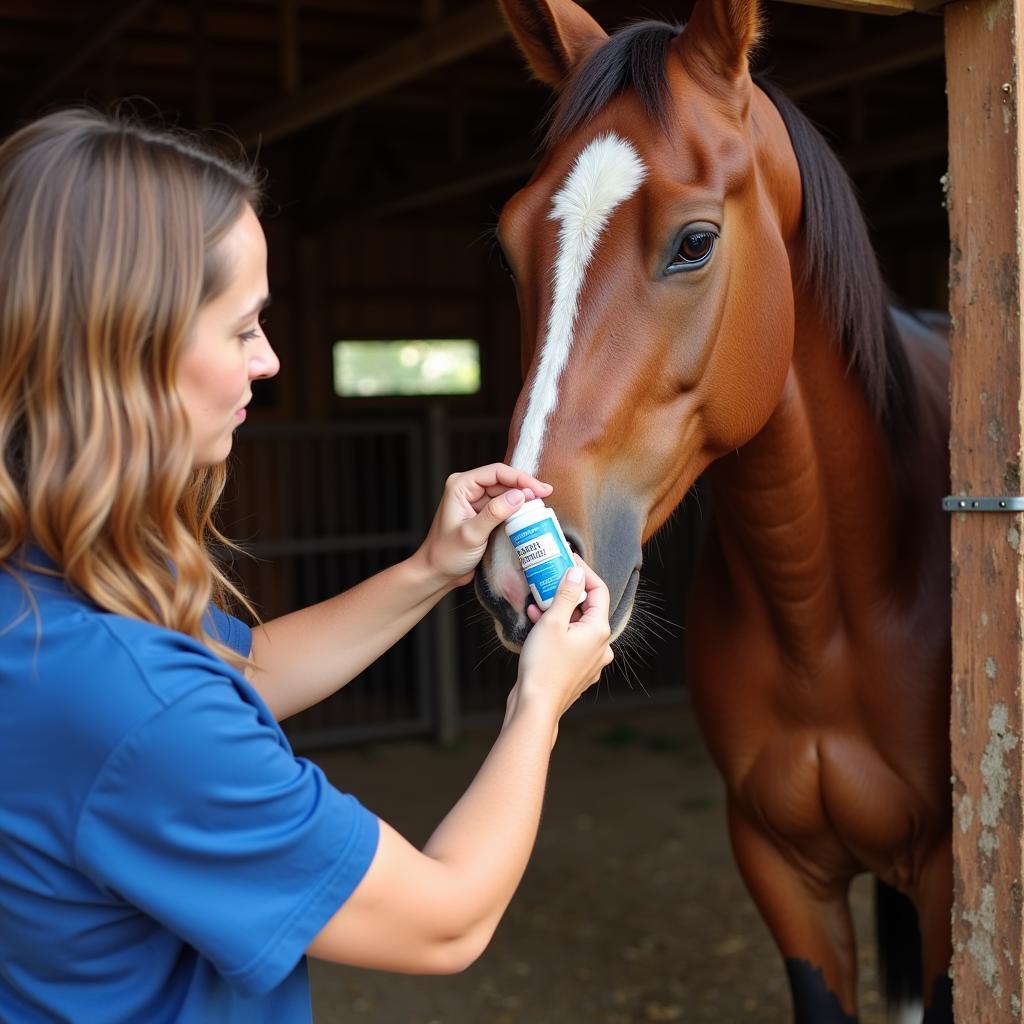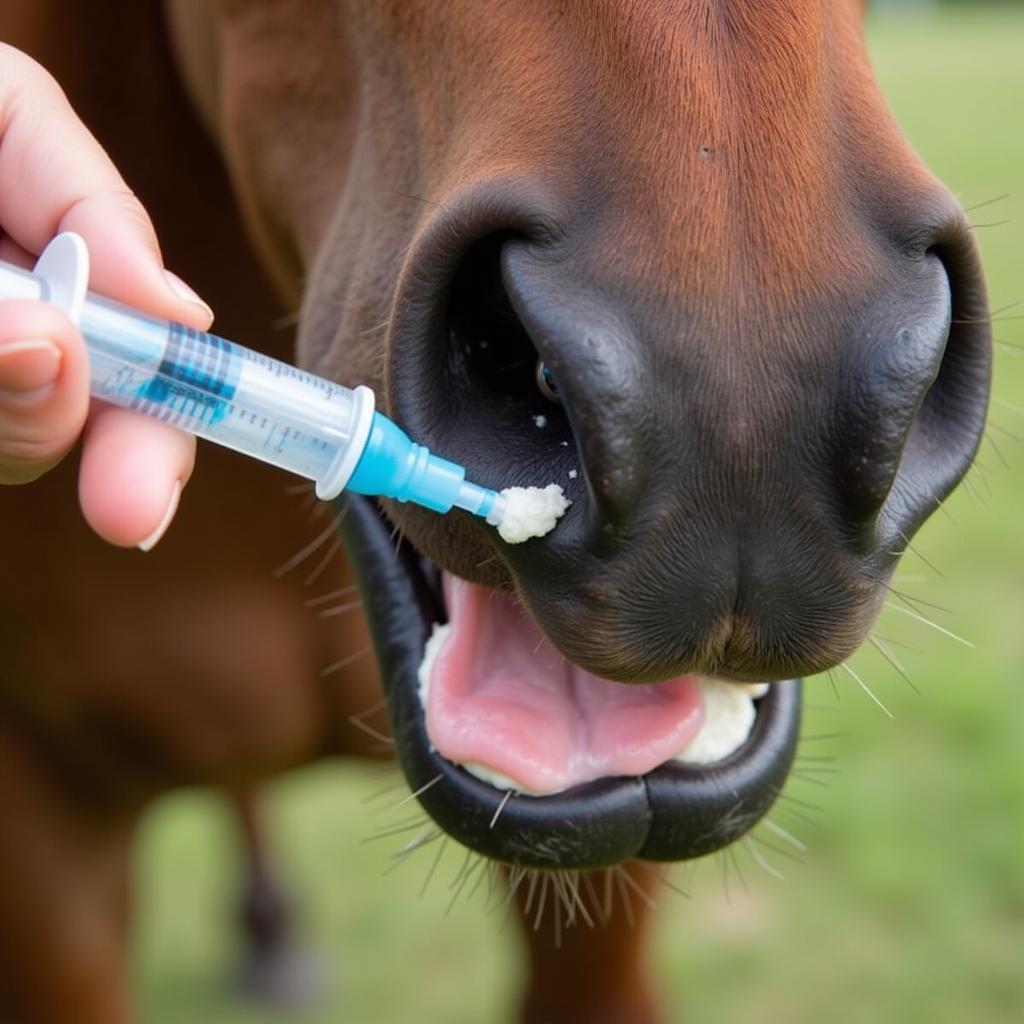Fenbendazole is a common dewormer used for horses. Understanding its uses, dosage, and potential side effects is crucial for responsible horse ownership. This guide provides a thorough overview of Fenbendazole For Horses, equipping you with the knowledge to make informed decisions about your horse’s health.
Understanding Fenbendazole: What It Is and How It Works
Fenbendazole is a broad-spectrum anthelmintic, meaning it’s effective against a wide range of internal parasites. It works by disrupting the worms’ energy metabolism, ultimately leading to their demise. This makes it a valuable tool in maintaining your horse’s health. Choosing the right dewormer is essential, and understanding how fenbendazole works is a key step in that process. Are you familiar with the different types of worming paste for your horse? For a better understanding, check out our comprehensive guide on worming paste horses.
Fenbendazole is available in various forms, including paste, granules, and suspension. The paste form is often preferred for its ease of administration. It’s important to consult with your veterinarian to determine the appropriate form and dosage for your horse.
 Horse Dewormer Paste: Fenbendazole Administration
Horse Dewormer Paste: Fenbendazole Administration
Dosage and Administration of Fenbendazole for Horses
The dosage of fenbendazole for horses varies depending on the specific product and the type of parasites being targeted. Always follow the instructions on the product label or consult with your veterinarian for the correct dosage. Overdosing can lead to adverse effects, while underdosing can render the treatment ineffective.
Administering fenbendazole paste is usually straightforward. Using a syringe, deposit the correct amount of paste onto the back of the horse’s tongue. Ensure the horse swallows the paste to prevent it from being spit out.
 Administering Fenbendazole to a Horse
Administering Fenbendazole to a Horse
Potential Side Effects of Fenbendazole in Horses
While generally safe, fenbendazole can sometimes cause side effects in horses. These are usually mild and transient, including mild diarrhea or loss of appetite. In rare cases, more serious side effects such as colic or liver damage have been reported. If you notice any unusual symptoms after administering fenbendazole, contact your veterinarian immediately. Do you know how to identify red worms in horses? Early detection is critical, so learn more by visiting our informative page on red worms in horses.
“Fenbendazole is a valuable tool, but like any medication, it should be used responsibly,” says Dr. Emily Carter, DVM, equine specialist. “Always consult with a vet to ensure the appropriate dosage and to rule out any potential contraindications.”
Fenbendazole for Specific Parasites: Targeted Treatment
Fenbendazole is effective against a variety of parasites, including roundworms, lungworms, and some types of tapeworms. However, it’s not effective against all parasites, and your vet may recommend a different dewormer or a combination of dewormers for certain infestations. Looking for a convenient and comprehensive solution? Consider our annual horse dewormer pack.
Developing a Deworming Program for Your Horse
A strategic deworming program is vital for maintaining your horse’s health. This involves regular fecal egg counts to determine the parasite load and targeted deworming based on the results. Consult with your vet to develop a personalized deworming program tailored to your horse’s specific needs and environment.
Conclusion: Using Fenbendazole Responsibly
Fenbendazole is an effective dewormer for horses when used correctly. By understanding its uses, dosage, and potential side effects, you can make informed decisions about your horse’s health. Always consult with your veterinarian for guidance on the best deworming strategy for your horse. Remember, responsible deworming practices are crucial for maintaining a healthy and happy equine companion. Curious about other deworming options? Check out our guide on anthelcide horse wormer.
FAQ
- How often should I deworm my horse with fenbendazole?
- Can I give fenbendazole to pregnant mares?
- What are the signs of parasite infestation in horses?
- Are there any alternative dewormers to fenbendazole?
- How do I store fenbendazole?
- What should I do if my horse experiences side effects from fenbendazole?
- How can I prevent parasite infestations in my horses?
For further assistance, please contact us at Phone Number: 0772127271, Email: [email protected] or visit our address: QGM2+WX2, Vị Trung, Vị Thuỷ, Hậu Giang, Việt Nam. We have a 24/7 customer service team. We also have more articles related to horse health and care on our website. You might be interested in learning more about horse nutrition, hoof care, or common equine illnesses. Explore our resources and let us help you keep your horse healthy and happy.